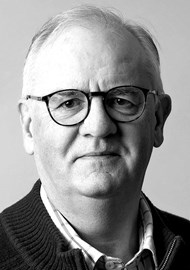Gabriel Weston’s new novel chronicles four traumatic weeks in the life of its narrator, Dr Nancy Mullion. Nancy is a young trainee in obstetrics and gynaecology, the subject of a General Medical Council (GMC) investigation into her clinical performance following a catastrophic bleed in a healthy young woman during the conduct of an apparently ‘routine’ termination.
Nancy’s thoughts, fears, emotions and reflections have an eerie authenticity about them, and will strike terror into us medical readers who live with the constant niggling unease that we may at any time be subject to intrusive scrutiny. Nancy’s dread as she sits “waiting to be ushered through that unopened door” is palpable, superbly conveyed by Weston’s taut, sparse language: “Oh, please don’t let me be undoctored. Do not strike me off, erase me, make me nothing.”
There are multiple flashbacks to Nancy’s childhood, adolescence and student days. We learn about her early sexual experiences, her time at school, and her journey as a young doctor. We are given a fascinating insight into her motivation, her aspirations, and her influences as her career takes shape. In many cases, the anecdotes of hospital life are frighteningly real and may give senor colleagues much to reflect on. As she ascends the medical hierarchy, Nancy finds herself taking a special interest – and developing a special expertise – in termination of pregnancy. Despite accepting that this is “a legal procedure, and women are entitled to it” and her view that “like every other civilised person I knew, I agreed with abortion on principle”, she has major reservations about the ethics of terminating healthy pregnancies. A colleague – and professional rival – works in the assisted conception unit (ACU). The heroic efforts of doctors and patients alike to help couples struggling with infertility – and the joy that greets a much-wanted birth – seem to contrast sharply with the almost casual approach to terminating teenage pregnancies. Nancy’s moral and ethical dilemmas on the subject of abortion are coloured by her own experience; we learn that “once upon a time, I needed one myself”. She describes her feelings as she visits a Marie Stopes clinic that she was “a fool and a fraud for not having better reasons for making my solemn request”, and reflects that a person “can’t have a thing like that in her life and just edit it out”.
As the novel reaches its denouement and Nancy learns her fate, she reflects on complex feelings. She has performed many early abortions, and finds it is “much harder to have it done than it is to do it”. Readers may find the descriptions of the mechanics of removing the products of conception and disposing of them disturbing, but as Nancy tells us, “A person should be responsible for their own dirty work, not give it to another member of staff to do it for them. If you are going to do this job, you should have to face the whole thing, I think.”
Dirty Work is a fascinating, thought-provoking and at times deeply troubling tale. Weston presents a balanced and brutally honest portrayal of a difficult theme. She is careful not to preach, but readers cannot fail to be profoundly engaged by the dilemmas she explores, whatever their positions when they come to the novel. Apart from the issues around pregnancy and termination, there is much to ponder in relation to the narrator’s experiences as a young doctor, her rapport with trainers, mentors and colleagues who are not always the paragons of virtue they perhaps should be, and her response to the harrowing events that form the subject of the GMC investigation. Doctors, whether senior or junior, have much to learn from this novel; it is a rich source of wisdom but hardly a sanitised easy read. Brace yourself, but do read it.
 Gabriel Weston author of Dirty Work is both a surgeon and author. Readers may recall that her first book, Direct Red: A Surgeon’s Story was also reviewed in ENT & audiology news. Published in February 2009, it was a memoir of her surgical career, which was long-listed for the Guardian First Book Award in September 2009 and won the PEN/J Ackerley Award for Autobiography in May 2010.
Gabriel Weston author of Dirty Work is both a surgeon and author. Readers may recall that her first book, Direct Red: A Surgeon’s Story was also reviewed in ENT & audiology news. Published in February 2009, it was a memoir of her surgical career, which was long-listed for the Guardian First Book Award in September 2009 and won the PEN/J Ackerley Award for Autobiography in May 2010.
Gabriel took an English degree at Edinburgh University, then turned to medicine, and went to medical school in London. While practising as a registrar, she wrote Direct Red. Gabriel still practises surgery, on a part-time basis at Frimley Park Hospital in Surrey specialising in skin cancer. She also makes regular television appearances. She has been working on a series for the BBC, Trust Me, I’m a Doctor, and last year she presented a programme for Horizon on obesity. She is married to a consultant vascular physician with whom she has four children and lives in London.
Her second publication, Dirty Work was published in June 2013. The novel explores the taboo subject of abortion and is reviewed here by Mr Ray Clarke, former Editor of ENT & audiology news.





